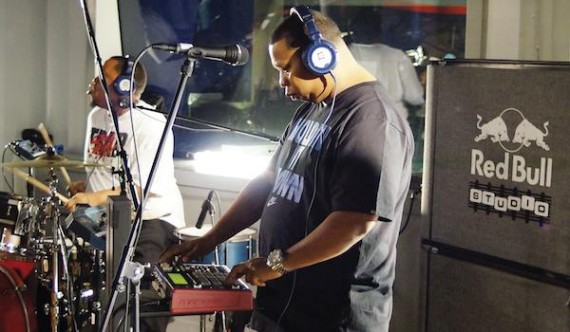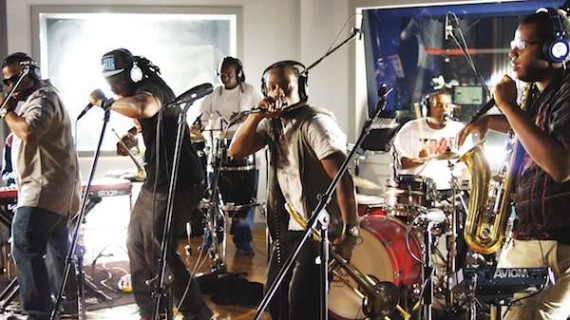
Mannie Fresh and the Stooges Brass Band in Red Bull Studios. Photo by Rich Kim/Red Bull Content Pool.
When the Stooges Brass Band rolled into Red Bull Studios Los Angeles with producer Mannie Fresh, it was a meeting of two titans of New Orleans street music. The Stooges are at the top of their game right now. Led by Walter “Whoadie” Ramsey and original band members Andrew “Drew” Baham and Ersell “Garfield” Bogan, they are one of hardest working bands in New Orleans, but haven’t released an official record under their own name since It’s About Time in 2003. Mannie Fresh is the most influential hip-hop producer to come out of New Orleans. He was recently recruited by Kanye West to produce tracks for a compilation on his G.O.O.D. Music label, but he still works with local artists including OffBeat’s March cover subject Dee-1.
New Orleans rap music has featured second-line drum patterns and brass band samples since the late ‘80s and MC J Ro J’s “Let’s Jump” 45, and brass bands have featured rap artists for the last couple of decades. Rebirth Brass Band featured Soulja Slim and Cheeky Blakk on 2001’s Hot Venom, and Hot 8 Brass Band included 5th Ward Weebie on 2005’s Rock with the Hot 8. Coolbone dropped several albums of a fusion they called “brass hop” in the late ‘90s, but the pairing of top producer with top brass band with three days to dedicate to music in a world-class studio had not happened quite this way before, and the resulting tracks could help define New Orleans music in the new millennium.
A successful brass band in New Orleans works hard. Bands often have a revolving cast of five to 10 members and need a solid stream of income to sustain themselves and their families. The Stooges play several gigs each week, second lines every Sunday, practice, do studio work, and the Stooges Music Group now manage the Hi-Ho Lounge. To prepare for the Red Bull sessions, they met with Mannie Fresh several times in New Orleans, so that when they rolled into the studio that Wednesday at noon, they were ready. Their mission was to finish two songs in three days, but ended up with most of four songs and a live studio session in the can by Friday night.
A recording session at the Red Bull Studios is not something you can call up and book. The studio is a technical wonderland and features the last Solid State Logic K series, 48-channel, fully analog board ever built. Chief engineer and studio manager Eric Stenman explains, “We’ve been open four years, but it’s a private studio. No phone number, no advertising. It’s just for projects that Red Bull is involved with. We’ve done national acts with everyone from 50 Cent to Weezer to M.I.A. to Jamie Foxx to Anthrax, as well as lots of smaller bands.”
Since winning the Red Bull Street Kings competition in 2010, the Stooges have taken their title literally. Clifton “Spoog” Smith, sousaphone player, summed up the band’s philosophy with an axiom from Ramsey: “Have fun, but play your horn like it’s your last time.” Cameron Johnson and John Perkins were recruited from the Free Agents Brass Band in 2011. “I used to go to Stooges open rehearsals when I was in high school,” Johnson says. “That really helped me learn the music. When they asked me and John to join the band, it felt like we were already family. The Stooges are a confidant band, but they’re good. They can back it up.”
The centerpiece of the session was a new version of the emotional tribute to Joseph “Shotgun Joe” Williams that has become a brass band standard. “Why They Had to Kill Him” is a poignant remembrance of a fallen friend and a scathing indictment of the police officers that killed the Hot 8 trombone player and the justice system that failed to prosecute anyone for the murder. Mannie Fresh recruited R&B star and former Cash Money recording artist TQ to sing the powerful hook: “Why’d they have to kill him? They have the nerve to say they protect and serve. / They need to change their logo because we can’t trust the popo.”
The new version starts with a Mannie Fresh drum pattern and a tuba loop. Bogan and percussionist John Dotson played drums and congas respectively over the loop with the full horn section and keys layered over that. The sound is a melding of R&B, brass and rap that will be bumping out of open car windows all summer.
“We wrote this song in 2004,” Ramsey says. “It’s 2012. When we starting singing it, we had a lady in New Orleans say to us that her brother had gotten killed by the police 20 years before that, and the song really touched her heart. Being a police is a hard job. I have a couple of cousins who are police. They have to make split-second decisions, but killing is different. They don’t have to do that. The song is needed to spread the message that these things are happening and we need some justice.”
To Andrew Baham, the song is relevant now as much as the day Joe died. “We’ve been making this outcry for years, and now it really has a chance to spread,” he says. “Shotgun Joe was just one case in many that happen every year. We have to find a way to address not only police brutality but brutality in general. The climate we are in now, including Trayvon [Martin]—we have to come to a consensus that an injustice is an injustice for everybody.”
Midway through Thursday, “Wind It Up” began to take shape. With the familiar second-line chant, “Wind it up for Michael Buck,” the tune is based on a D.C. go-go beat featuring Bogan on drums and Clifton “Spoog” Smith laying down a chunky sousaphone bass line. The track could stand alone as is, but Mannie Fresh had keyboard player Andrew “B Rabbit” McGowan layer a progression of synth horn stabs and a funky Clavinet line. “Michael Buck was my stepfather,” Ramsey says. “He second lined with the Black Men of Labor Social Aid and Pleasure Club. He used to do this dance where he was popping his hands and shaking his leg and called it the Wind-It-Up.”
Throughout the session, Mannie Fresh was there behind his Akai MPC 1000 and a couple of M-Audio keyboard controllers, cracking jokes, singing improvised R&B hooks, and having a good time while keeping the energy up. While everyone else was listening to edits or working out parts, he was in the midst of it all with headphones on working out a new beat, or heading in to the booth to help one of the Stooges run through a difficult vocal line.
In the 1990s, Cash Money and Southern rap were often stigmatized in national media as less “musical” than rap from other regions. Fresh disagrees. “My earlier Cash Money songs were made by a live band with a drum machine,” he says. “We never really sequenced. We actually played all those songs from beginning to end. A lot of Juvenile’s 400 Degreez was live musicians. I made the drums and we played to the drum track. To me, that’s what made the music better. It gave it a real feel. The bass line’s changing, and the chords are changing. Music has just now gotten to this whole computer thing. Southern hip-hop has always been real musicians. If you go back to Outkast, 8Ball & MJG, or Geto Boys, that was real bass players, organs, real keyboards. If you go back to UGK’s first album, they used guys from New Orleans. A lot of people don’t know that, but a lot of UGK’s songs were the Meters.”
The most surprising track in the session is a dance track dedicated to partying and having fun. Mannie Fresh laid down a South Beach club track with a piano loop, and TQ dropped an R&B hook: “This is my life and you can’t tell me what to do ‘cause we’re having fun. / Turn the music way up and pour some drinks for everyone.” It is a direct appeal to the clubs with a stutter step, airhorn and sing-along vocals.
For the beat, Fresh slowed down and chopped up an ethereal vocal chorus and string selection from a sweet soul song. Then he brought in guitarist Joel Whitley to play some psychedelic Shuggie Otis-style West Coast licks, or as Fresh says, “do some ‘70s over top of it and make you feel like pimps.” He also introduced the song: “It has been brought to my attention that due to the deficit and the economy crashing, that ballin’ is out of style. So, for the regular man, I say…,” then he and Bogan drop the verse. “I’m average, I drive a Civic / If you like what I’m talking about then maybe we can kick it.”
The Stooges are ready to take their sound to an international audience. As Baham puts it, “For many years, ever since this band was founded 15 years ago, we’ve been treated somewhat as second-class citizens. But how many brass bands can say they have had the privilege of having a world-recognized, multi- award-winning producer at their disposal? There’s really no brass band that had that privilege.” With the talent, commitment to hard work, and the willingness to try something new—they’re touring Pakistan in July—“I’m Average” might end up closer to “#1 Stunna”.
The Stooges Brass Band plays Jazz Fest on Thursday, May 3 at 2:40 p.m. on the Congo Square Stage.





